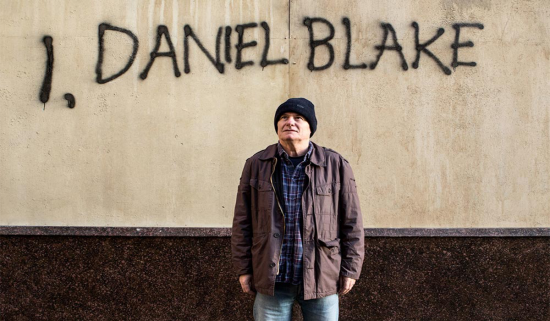Review: I, Daniel Blake – “As important and powerful as cinema can get”
It is hard to imagine the British film industry in the current sociopolitical climate without the contribution of Ken Loach’s distinct voice. His decision to come back from the retirement he’d announced in 2014 was a relief for world cinema but especially for a nation that now more than ever needs the support and inspiration of one of its finest artists.
No British film this year will be able to present the current state of affairs in Britain in the same eerily accurate way I, Daniel Blake does. This is emotionally raw filmmaking – an important oeuvre, which encapsulates the multifaceted nature of the human condition and denounces the oppression of the very system that’s supposed to guarantee citizens’ well being.
There’s nothing to argue about the film being laureled with the Palme D’Or at this year’s Cannes Film Festival and if anything, it’s an outstanding achievement for the British filmmaker who had already won the prestigious accolade in 2006 with The Wind That Shakes The Barley.
A stark beginning – no music, no fuss – this is real life and it’s the trademark of master Ken Loach. The opening credits fade in and out over a black screen whilst a conversation between a man and a woman plays out in the background. It takes a moment to put the words into context and by the time the voices turn into faces, we’re already hooked by the titular character who’s about to jump on a highly emotional rollercoaster.
What happens in between, before credits roll in equally somber fashion, is destined to move you, anger you and entertain you in equal parts because life is a tragicomedy and the sociopolitical message of the film is actually strengthened by the moments you can’t help but laugh at.
Daniel Blake (Dave Johns) is a carpenter who recently suffered from a heart attack and was deemed unfit to work by his GP. The opening sequence finds him at an interview appointment with a government healthcare representative as he applies for financial support and we immediately get the sense of hopeless frustration that comes with getting sucked into the ridiculous maze of bureaucracy.
It should all be pretty straightforward when you have just had a heart attack and your doctor has already established you can’t be doing the kind of heavy manual labour Daniel does, yet the man’s request is inexplicably denied. Whilst trying to get a hold of someone to process his appeal against this absurd verdict, Daniel gets stuck in interminable queues on the phone, forced to listen to “shite music”, as he puts it, only to find someone utterly unhelpful.
Although this is already making the blood stir in your veins, it’s merely the beginning of Daniel’s trials and tribulations. Whilst waiting for his appeal to go through at the snail’s pace at which these things usually proceed, this poor old widower with no savings and no pension can’t afford to live income-less and so he’s advised to apply for jobseekers’ allowance.
It’s indeed at the job centre that Daniel meets Katie (Hayley Squires), a single mother of two who had no choice but move to Newcastle (where the story takes place) from London in order to be able to to get a decently sized flat for her children to live in. Katie of course has her own fair share of infuriating bureaucratic absurdities to deal with and Daniel becomes a sort of knight in shining armour coming to the rescue – it starts off as practical help but soon evolves into the more important emotional support both Katie and her kids need.
Having no family or friends in the new city, the young woman and her children practically earn a father and a grandfather in Daniel, as the man endearingly takes care of them in every possible way, despite being overwhelmed by his own bleak reality. And that’s the film’s moving message when it’s all said and done – the importance of the powerful sense of community that comes with the charitable spirit of those who put the needs of others before their own.
Daniel Blake isn’t just a character on the screen – Daniel Blake could be me or you. The marketing campaign couldn’t stress it any clearer with its Twitter hashtag – #WeAreDanielBlake – and they couldn’t be any more right. I for one was on Jobseeker’s Allowance for 4 months this year and though I was lucky enough to find work (no thanks to our friends at the Job Centre) I would’ve never imagined that one day I’d find myself with no other choice but claim for benefits.
Loach’s long time collaborator Paul Laverty has done a marvellous job with the level of research and authenticity achieved in his script. And of course the brilliant director translates the story on screen with the incredible flair for British socialist realism that we’re accustomed to. The cast follows Loach’s lead with the utmost commitment to the filmmaker’s vision and remarkable sensibility for his unique storytelling craft.
I’ve lived in the UK for five years now – I just married a British man and I’m in the process of applying for residency – hence my viewing experience of Ken Loach’s film has inevitably been affected by another level of awareness. Before I could empathise with those stories on a general human level but now I’m an active participant in the world depicted by them and that’s the highest compliment I could offer to the British filmmaker.
I, Daniel Blake couldn’t be a more accurate portrait of where this country is and it’s out there for us to watch not just as mere spectators. It conveys a much needed sense of urgency to make our voices heard and react to a status quo that will only get bleaker if we let indifference numb our senses. That’s as important and powerful as cinema can get.











